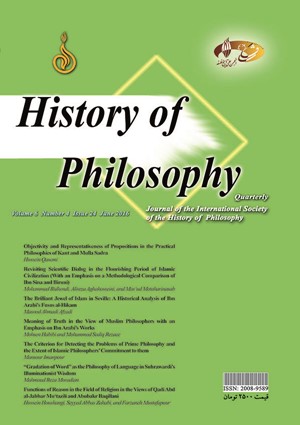-
-
List of Articles
-
Open Access Article
1 - Objectivity and Representativeness of Propositions in the Practical Philosophies of Kant and Mulla Sadra
-
Open Access Article
2 - foreword
Hossein Kalbasi Ashtari -
Open Access Article
3 - Objectivity and Representativeness of Propositions in the Practical Philosophies of Kant and Mulla Sadra
Hossein Qasemi -
Open Access Article
4 - Revisiting Scientific Dialog in the Flourishing Period of Islamic Civilization (With an Emphasis on a Methodological Comparison of Ibn Sina and Biruni)
Mohammad Bidhendi Alireza Aghahosseini Mas‘ud Motaharinasab -
Open Access Article
5 - The Brilliant Jewel of Islam in Seville: A Historical Analysis of Ibn Arabi’s Fusus al-Hikam
Masood Ahmadi Afzadi -
Open Access Article
6 - Meaning of Truth in the View of Muslim Philosophers with an Emphasis on Ibn Arabi’s Works
Mohsen Habibi Mohammad Sadiq Rezaee -
Open Access Article
7 - The Criterion for Detecting the Problems of Prime Philosophy and the Extent of Islamic Philosophers’ Commitment to them
Mansour Imanpour -
Open Access Article
8 - “Gradation of Word” as the Philosophy of Language in Suhrawardi’s Illuminationist Wisdom
Mahmoud Reza Moradian -
Open Access Article
9 - Functions of Reason in the Field of Religion in the Views of Qadi Abd al-Jabbar Mu‘tazili and Abubakr Baqillani
Farzaneh Mustafapour
-
The rights to this website are owned by the Raimag Press Management System.
Copyright © 2017-2026







